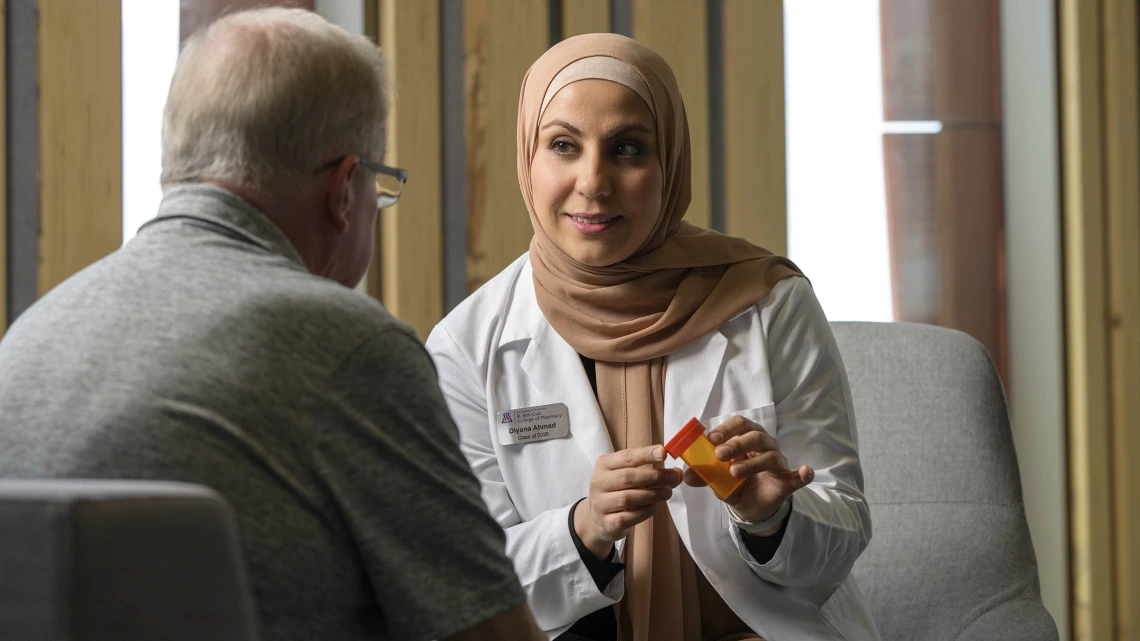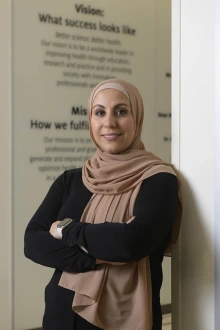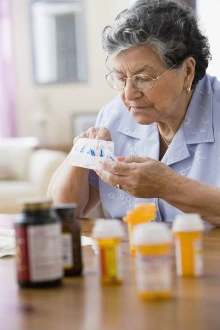Building bonds for better older adult health care
A Coit College of Pharmacy program provides students with practical knowledge that can be applied to caring for an older adult in their lives.

The Student and Older Adult Relationship program at the R. Ken Coit College of Pharmacy introduced Diyana Ahmad to a new friend and equipped her with skills that she intends to use to help people around the world.
Compassion comes naturally for Diyana Ahmad. She received a surgical assistant degree while in high school and went on to become the first in her family to earn a bachelor’s degree. She wanted to go to medical school, but her plans changed. Instead, she traveled and worked with the United Nations, in places like Africa, and in various international schools and refugee camps.

Ahmad says the SOAR program showed her the importance of setting aside time to explain and answer questions with older adults.
“I’ve always wanted to help people,” said Ahmad, who is Kurdish and grew up in the northern part of Iraq before moving to the U.S. at 14. “In my country, where ISIS and terrorists capture women, there can be a lot of depression. And in the eight years I worked with the United Nations, I was usually either teaching women how simple things like better hygiene practices could improve their health and the importance of using protection to not have a lot of kids.”
Her experiences helping people around the world put a new career path in Ahmad’s mind: ambassador. She believed that if she ever wanted to become an ambassador, an advanced degree may be preferred or even required. That need brought her back to the United States to pursue a Doctor of Pharmacy degree at the University of Arizona R. Ken Coit College of Pharmacy, part of UArizona Health Sciences.
Among the educational opportunities at the Coit College of Pharmacy is the Student and Older Adult Relationship program, or SOAR, which is supported by the University of Arizona Health Sciences initiative Innovations in Health Aging. The initiative’s goals include connecting with older adults in the community, partnerships to discover and implement new models for healthy aging, campus-wide research to encourage new discoveries, and educational opportunities to train a new generation of health care providers.
Offered in the spring semester, SOAR equips students with the skills needed to provide effective care for older adults. The course objectives are comprehensive, focusing on not only technical aspects but also cultural competence, communication and empathy.
“SOAR is an embodiment of our commitment to fostering compassionate health care professionals,” said Jenene Spencer, PharmD, instructor of pharmacy practice and science at the Coit College of Pharmacy. “The goal is not merely to impart knowledge, but to cultivate a deeper understanding of the aging population and to instill in our students a profound sense of empathy.”
Empathy for an aging population
The United States is facing a growing health care challenge: addressing the needs of its aging population. According to the 2020 Census, approximately 1 in 6 Americans are aged 65 or older. This proportion has significantly increased since 1920 when it was less than 1 in 20. From 2010 to 2020, the 65-plus population saw its largest 10-year numeric gain ever, with an increase of 15.5 million individuals. In Arizona, there are some 1.4 million people 65 and older — a number that's grown more than 50% over the past decade.

The Student and Older Adult Relationship program is taught by Jenene Spencer, PharmD, and Sandi Thoi, PharmD. Spencer teaches in-person to the students in Tucson, while Thoi’s classroom is in Phoenix. Their classrooms are connected through Zoom, allowing students in both locations to learn from each instructor. Subject matter expert speakers are also able to join both classes simultaneously.
This stark demographic shift is putting immense pressure on health care systems, particularly in meeting the needs of older adults, who typically have more prescription medications than younger people and increased health risks from incidents like falling. People aged 65 and older make up just 12% of the U.S. population, yet they account for 34% of all prescription medication use and 30% of all over-the-counter medication use. Furthermore, approximately half of the 1.6 million residents in U.S. nursing facilities experience falls each year, and around 1 in 3 of those who fall do so multiple times.
SOAR aims to meet the needs of this aging population. SOAR presents students with the opportunity to engage with older adults, honing their interview and counseling skills, administering assessments and reviewing medication, health, and vaccine histories.
Course objectives range from understanding what it’s like to be an older adult through aging simulation exercises to developing cultural competence when interacting with older adults and conducting and documenting medication histories. Students learn to use tools for assessing mental status, health literacy, nutrition, depression, sleep quality and fall risk, all while identifying treatment priorities in older adults with complex medical histories.
“Our course is a hybrid class because it’s a didactic class with the experiential portion blended together. It’s about building the relationship with the older adult and gaining the empathy that comes from seeing the different perspectives of older adult care that they don’t think about until they experience it,” said Sandi Thoi, PharmD, an instructor of pharmacy practice and science at the Coit College of Pharmacy who co-instructs the course with Spencer.
"I am so happy I took this class, and I’m so happy that I found a new friend.”
—Diyana Ahmad
A meaningful connection
Ahmad discovered firsthand the importance of connecting with an older adult last spring when she took the course. While many students can choose to work with a parent, grandparent or other relative, Ahmad wanted to establish a connection with someone new. Her immediate family was in good health, so she felt her time and attention would be better applied to someone who needed help. She thought of a neighbor she knew only from brief interactions or a wave ‘hello’ from afar.
“He always seemed very kind, but a little bit lonely at times,” Ahamd recalled. “His wife passed away about a year-and-a-half earlier. I wasn’t sure what he would say, but when I told him what the class was about and asked him, he was like ‘Oh my god! Of course I will.’”

People aged 65 and older account for 34% of all prescription medication use in the U.S. The SOAR program teaches students skills they can apply in their careers to ensure older patients know what their doctors prescribed and why and how to properly take the medications.
Ahmad began meeting with her neighbor weekly. In her initial visit to his home, she noticed a number of things that needed attention, among them expired medications. She reviewed his immunization records and was surprised to see he was behind on five vaccinations. In the kitchen, he was using a chair to change light bulbs and access things he could not reach.
“It was so unsafe,” Ahmad said. “We went out and bought a stepstool. I helped him change a few light bulbs, and we cleaned out his closet.”
Each week, Ahmad returned and helped the man review his medication lists and stay up to date on his medical visits. She encouraged him to become more connected with the neighborhood, where there were many other older adults, and see if others could use help, too. Together, they reached out to other neighbors and identified which ones lived alone. They reviewed medications lists and checked for any hazards in their homes, too.
At the time, Ahmad couldn’t have known she would find much more than education at UArizona Health Sciences; she found a friend in her older adult educational partner. In fact, he shocked her last spring by offering something no one had before.
“One of the best memories I have was while I was fasting during Ramadan. He came over and said he was going to fast with me. I could not believe it. I said, ‘What do you mean?’ He was like, ‘I’m fasting with you.’ Then we prayed together. It was amazing because I felt like I was supposed to be helping him, but here he is sharing in my life, too.”
Even after completing the SOAR class at the end of her first year of pharmacy studies, Ahmad remains connected to her neighbor. She continued to visit him throughout the summer, and even traveled to California to see him when he was visiting another family member battling health issues.
“I feel like I found a new member of my family. I love it so much, and I thank God that we had the SOAR program to be connected. That class makes you be close to your loved ones and even meet new ones. I am so happy I took this class, and I’m so happy that I found a new friend.”
Our Experts
Jenene Spencer, PharmD
Instructor of Pharmacy Practice and Science, Coit College of Pharmacy
IPPE Coordinator, Experiential Education, Coit College of Pharmacy
Sandi Thoi, PharmD
Instructor of Pharmacy Practice and Science, Coit College of Pharmacy
Regional Coordinator, Experiential Education, Coit College of Pharmacy
Contact
Blair Willis
Office of Communications, University of Arizona Health Sciences
520-419-2979, bmw23@arizona.edu

